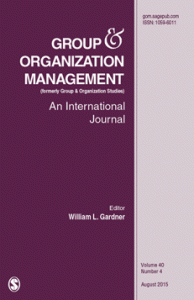The authors of a paper on supportive supervisors just want readers to “better understand the reported findings,” and so have issued multiple “clarifications” in a corrigendum note.
Some of the issues addressed in the note have been raised on PubPeer.
The paper’s author list includes one Fred Walumbwa, formerly an Arizona State University management researcher, some of whose work has succumbed to scrutiny in the the past two years. His current list: seven retractions, a megacorrection, an expression of concern, and now this.
“Unraveling the relationship between family-supportive supervisor and employee performance,” published in Group & Organization Management, has been cited twice, according to Thomson Scientific’s Web of Knowledge.
Here’s the note in full:
The authors have provided the following clarifications to help readers better understand the reported findings and their interpretations: First, the correlation coefficients reported in Table 1 are based on pairwise deletion of missing values, whereas the R2s of Models 1, 5, and 6 reported in Table 2 are based on listwise deletion. A correlation coefficient is usually computed in SPSS with pairwise deletion based on all data available for each pair of variables. Listwise deletion is a common and valid approach in handling missing value in regression analysis. As it removes cases if there is a missing value on any of the variables in the regression equation, this approach (listwise deletion) causes sample size reduction. For this reason, in the current analysis, the size of our analysis sample for Models 1, 5, and 6 reduced from 209 (total sample size) to 135 for regression analysis.
Second, the reported degrees of freedom (df) of 48 for the hypothesized four-factor model as reported on p. 270 is based on an item-parceling approach we used in performing the confirmatory factor analysis (CFA). Item-parceling has been widely used in CFA to obtain optimal variable to sample size ratio (Coffman & MacCallum, 2005; Little, Cunningham, Shahar, & Widaman, 2002; Little, Rhemtulla, Gibson, & Schoemann, 2013). In the current analysis, two parcels were randomly created for relational identification in the CFA to maintain an acceptable indicator-to-sample ratio.
Walumbwa is currently based at Florida International University. We emailed corresponding author Peng Wang at Miami University and the journal’s editor in chief. We will update this post if we hear back.
Like Retraction Watch? Consider making a tax-deductible contribution to support our growth. You can also follow us on Twitter, like us on Facebook, add us to your RSS reader, and sign up on our homepage for an email every time there’s a new post. Click here to review our Comments Policy.

Personnel Psychology has issued a new expression of concern regarding two additional articles by Professor Walumbwa in January 2016:
http://onlinelibrary.wiley.com/doi/10.1111/peps.12148/abstract